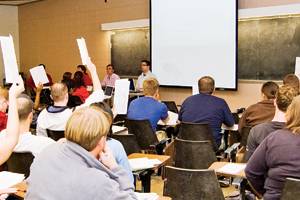Attendance problems could hurt GPSS funding

GPSS meeting on Sept. 29, 2008, in Room 124 of Ross Hall. Recently GPSS meetings have run into issues with attendance, which is a problem because 2/3rds of the Senate must be present to pass amendments. File Photo: Logan Gaedke/Iowa State Daily
October 6, 2008
Low attendance at Graduate and Professional Student Senate meetings could cause ramifications from the Student Activities Center.
Since the beginning of the semester, GPSS has been unable to amend its constitution to comply with the Student Organization Recognition Policy. In order to pass an amendement to the GPSS constitution, two-thirds of the Senate must be present and pass the measure with 60 percent approval. This must happen at two separate meetings. At its September meeting, GPSS had the required two-thirds attendance present and was able to pass the amendment. However, the first meeting’s attendance failed to meet the attendance requirement. GPSS hopes to pass the amendments at its next meeting at the end of the month.
Compliance with the policy is necessary for the Student Activities Board to recognize the student organization.
“We’re in a very, very dangerous position, not passing the SORP- [Student Organization Recognition Policy] related constitutional amendments,” said Ryan Myers, GPSS at-large senator-Government of the Student Body, GSB graduate senator and graduate student in accounting.
According to the ISU Policy Library, student organizations must submit their recognition of the policy annually.
In addition to requiring members to maintain at least a 2.00 GPA and be enrolled in a minimum of six credits, SORP also outlines a non-discrimination policy.
Zachary Ford, GPSS chief information officer and graduate student in educational leadership and policy studies, said it was simply a matter of some language in the GPSS constitution that needed to be adjusted to comply with the policy.
He said the organization could face some risks if the Student Activities Center decided to enforce the policy.
“It’s very likely that we could lose access to our funding,” said John Schmitz, GPSS president and graduate student in food science and human nutrition. “Our accounts could be frozen if we don’t get our constitutional changes made.”
According to the Policy Library, recognition of the policy also allows organizations to use campus resources and apply for university awards.
Ford said some members became accustomed to missing meetings over the summer, but it was important to attend meetings in the fall semester.
“Over the summer we try to be lenient about attendance because our members have internships and other opportunities outside of Ames,” he said.
Now that the fall semester has begun, it is more important to attend meetings, he said.
At the last GPSS meeting, on Sept. 29, Schmitz told the GPSS members who were present to persuade their friends to attend meetings.
“A lot of you have peers from your department that weren’t here, so remind them to attend meetings,” Schmitz said.
Schmitz said it is possible for GPSS members to send a surrogate from their department if they can’t attend a meeting.
Ford said GPSS was planning on notifying students who weren’t attending of the problem, and said if students don’t show up for three meetings in a row, they could be removed from GPSS.
If GPSS has fewer members, it would be easier to meet the two-thirds attendance threshold, he said.
“It’s so they’re not working against us,” Ford said.









